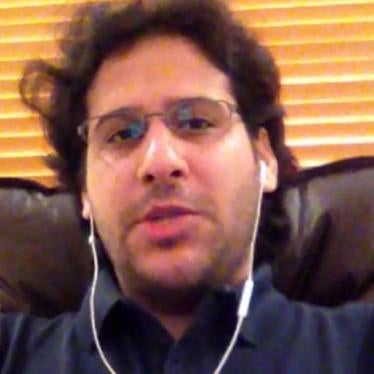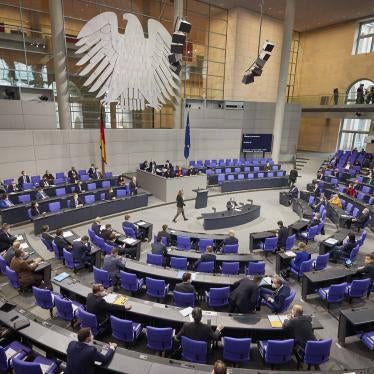People detained by the Palestinian Authority are frequently subjected to torture and denied access to fair trials, Human Rights Watch said in a new report released today.
The 50-page report documents how the Palestinian Authority executive branch - including President Yasser Arafat, his ministers, police, and various security forces - has seriously undermined the independence of the judiciary and the rule of law.
The report estimates that as of September 2001, the Palestinian Authority (PA) was holding about 450 people in detention without charge or trial. Most were suspected of being informants for Israeli security forces; others were alleged to have sold Palestinian land to Israelis. The PA has done virtually nothing to identify the perpetrators of about thirty vigilante-style executions, the report says.
"The Palestinian Authority wants to be treated as an equal with other governments," said Kenneth Roth, Executive Director of Human Rights Watch. "President Arafat must ensure that the PA has a functioning judicial system which operates to protect the human rights of all Palestinians." Roth urged Arafat to ratify several laws passed by the Palestinian Legislative Council that would help to protect the rights of detainees.
The Human Rights Watch report, "Justice Undermined: Balancing Security and Human Rights in the Palestinian Justice System," charges the PA with failing to bring to justice militants who have attacked Israeli civilians. The report also says that Israeli responses to the current "intifada," including severe restrictions on freedom of movement and the destruction of Palestinian law-enforcement infrastructure, have aggravated the deterioration of the Palestinian justice system.
The report says at least ten separate Palestinian security and police forces are operating in PA territory, all of them operating above the law. They have systematically ignored orders from the High Court to release detainees who are being held arbitrarily. Detainees are commonly arrested without a warrant and are not told the reason for their arrest nor allowed access to a lawyer during interrogation. Once arrested, they can spend months in detention without charge or trial.
The practice of incommunicado detention exacerbates the routine use of torture. Detainees are frequently subjected to "shabah" (prolonged sitting or standing in painful positions); "falaqa" (beating on the soles of the feet); punching; kicking; and suspension from the wrists. Five Palestinians are known to have died in police or security force custody since the current intifada began.
The State Security Court, established by presidential decree in 1995, has displaced and undermined ordinary courts. The president convenes the court on a case-by-case basis. Most trials last only a few hours, and most defendants are convicted solely or principally on the basis of confessions they made while in incommunicado detention. The accused are usually defended by court-appointed counsel who are not practicing lawyers, but serving members of the security forces. Defense lawyers sometimes have as little as a few minutes to prepare their defense.
Since the current intifada began, sixteen defendants have been tried in the Higher State Security Court or the Military Court. Fifteen have been convicted, of whom eleven have been sentenced to death. Two executions have been carried out.
The report describes a "revolving door policy" of arresting alleged members of militant groups such as Hamas or Islamic Jihad, often under pressure from Israel or the international community, holding them without charge or trial, and then releasing them.
On October 31, the PA issued six-month-long administrative detention orders against seven alleged members of Hamas and Islamic Jihad.
"Issuing administrative detention orders can only further weaken the Palestinian justice system," said Roth. "Instead of charging and bringing suspects to court, the PA now seems determined to by-pass such procedures and hold suspects in detention without trial."
The report includes detailed recommendations for measures that the PA, the government of Israel, and major donors must take to improve the situation.







